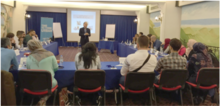
Through enhancing the role of Unions of Municipalities to Respond to Refugees’ & Host Communities’ Needs, UN-Habitat launched two Regional Technical Offices (RTOs) in 3 Unions of Municipalities (UoMs) in Sahel Zahrani and Iqleem al-Kharoub. The RTOs are positioned in such a manner to increase city resilience and play an active role in urban risk reduction policies, strategies and programmes. The RTO’s bring to the attention of municipalities issues such as renovation of facades, raising awareness on the importance of public spaces, coordinating with national and local authorities in case of natural disasters or threats. The RTO’s play an active role and being positioned in unions increases their effectiveness over many municipalities.
Moreover, the cities of Beirut and Tripoli have also been selected as pilot cities for the Global UN-Habitat programme, City Resilience Profiling Programme (CRPP). The CRPP provides national and local governments with tools for measuring and increasing resilience to multi-hazard impacts, including those associated with climate change. Working through partnerships with stakeholders including international agencies, academic and research institutes, private sector actors and NGOs. The CRPP will develop a comprehensive and integrated urban planning and management approach for profiling and monitoring the resilience of any city to all plausible hazards.
As part of the City and Neighbourhood Profiling Programme, together with UN-Habitat Lebanon involvement as shelter co-lead in the LCRP, a neighbourhood profile and rapid assessment is already underway in the eastern suburbs of Beirut, Naba’a. UN-Habitat efforts aim at implementing shelter rehabilitation programmes working in partnerships and the community to contribute to sustainable and resilient cities and other human settlements. The neighbourhood profile addresses the urban crisis in cities, and mainly in poor neighbourhoods by adopting an integrated approach. This initiative seeks to
improve the living conditions of Syrian refugees and host communities through adopting holistic neighbourhood upgrading strategies.
